2020年1月23日雅思阅读答案解析
- 格式:docx
- 大小:37.89 KB
- 文档页数:3
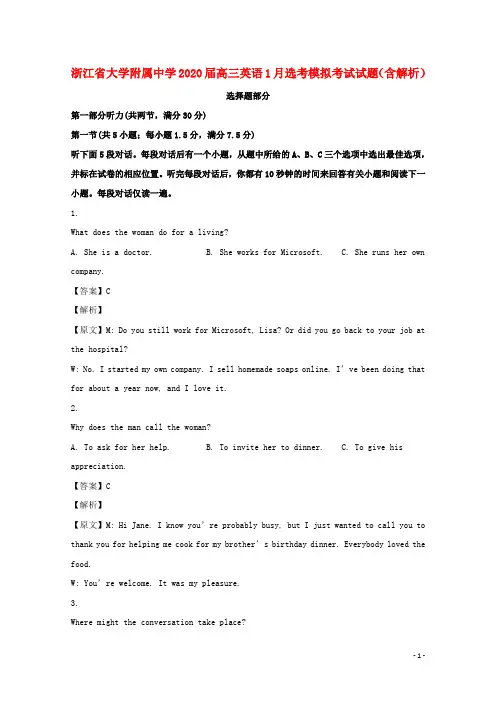
浙江省大学附属中学2020届高三英语1月选考模拟考试试题(含解析)选择题部分第一部分听力(共两节,满分30分)第一节(共5小题;每小题1.5分,满分7.5分)听下面5段对话。
每段对话后有一个小题,从题中所给的A、B、C三个选项中选出最佳选项,并标在试卷的相应位置。
听完每段对话后,你都有10秒钟的时间来回答有关小题和阅读下一小题。
每段对话仅读一遍。
1.What does the woman do for a living?A. She is a doctor.B. She works for Microsoft.C. She runs her own company.【答案】C【解析】【原文】M: Do you still work for Microsoft, Lisa? Or did you go back to your job at the hospital?W: No. I started my own company. I sell homemade soaps online. I’ve been doing that for about a year now, and I love it.2.Why does the man call the woman?A. To ask for her help.B. To invite her to dinner.C. To give his appreciation.【答案】C【解析】【原文】M: Hi Jane. I know you’re probably busy, but I just wanted to call you to thank you for helping me cook for my bro ther’s birthday dinner. Everybody loved the food.W: You’re welcome. It was my pleasure.3.Where might the conversation take place?A. On a golf course.B. In a doctor’s office.C. In an emergencyroom.【答案】B【解析】【原文】M: Mrs. Lang, where is my three o’clo ck appointment? They are ten minuteslate.W: Oh! I’m sorry, Mr. Robertson. Your patient cancelled the appointment because ofa family emergency.M: Well, that was my last patient. If anyone else wants to reach me, I’ll be on thegolf course.4.【此处可播放相关音频,请去附件查看】Why does the woman want soup? A. Because of her health. B. Because of the weather. C. Because of the low price【答案】B【解析】【原文】W: You know what, on rainy days like this, I really want soup…M: Well, let’s go get some! There’s a place on 4th Street t hat has delicious soup,and it’s pretty cheap.5.What are the speakers talking about? A. What time to meet. B. Where to go dancing. C. What to eat for dinner. 【答案】A 【解析】【原文】M: I’m glad we’re going dancing tonight! Can we meet at the club at 8:00?W: Well, I don’t have anything to do before that. Let’s have dinner at Antonio’srestaurant. Want to meet at 7:00?M: It’s up to you. I could meet as early as 6:00.第二节(共15小题;每小题1.5分,满分22.5分)听下面5段对话或独白。
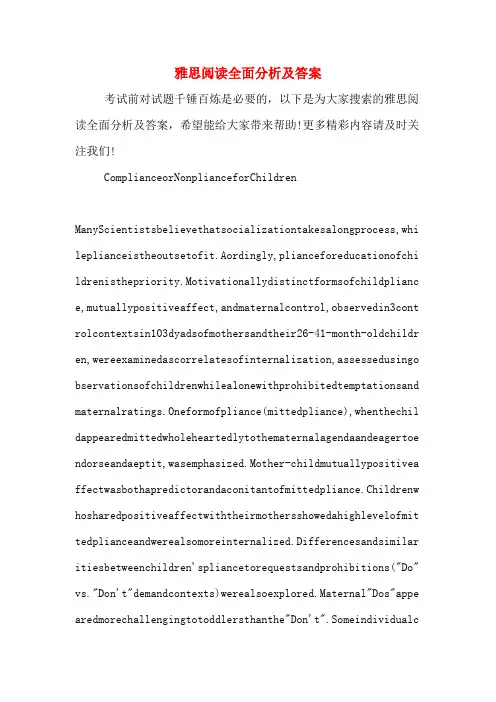
雅思阅读全面分析及答案考试前对试题千锤百炼是必要的,以下是为大家搜索的雅思阅读全面分析及答案,希望能给大家带来帮助!更多精彩内容请及时关注我们!ComplianceorNonplianceforChildrenManyScientistsbelievethatsocializationtakesalongprocess,whi leplianceistheoutsetofit.Aordingly,plianceforeducationofchi ldrenisthepriority.Motivationallydistinctformsofchildplianc e,mutuallypositiveaffect,andmaternalcontrol,observedin3cont rolcontextsin103dyadsofmothersandtheir26-41-month-oldchildr en,wereexaminedascorrelatesofinternalization,assessedusingo bservationsofchildrenwhilealonewithprohibitedtemptationsand maternalratings.Oneformofpliance(mittedpliance),whenthechil dappearedmittedwholeheartedlytothematernalagendaandeagertoe ndorseandaeptit,wasemphasized.Mother-childmutuallypositivea ffectwasbothapredictorandaconitantofmittedpliance.Childrenw hosharedpositiveaffectwiththeirmothersshowedahighlevelofmit tedplianceandwerealsomoreinternalized.Differencesandsimilar itiesbetweenchildren'spliancetorequestsandprohibitions("Do" vs."Don't"demandcontexts)werealsoexplored.Maternal"Dos"appe aredmorechallengingtotoddlersthanthe"Don't".Someindividualcoherenceofbehaviorwasalsofoundacrossbothdemandcontexts.Thei mplicationsofmittedplianceforemerginginternalizedregulators ofconductarediscussed.Anumberofparentswerenoteasytobeawareofthepliance,someevenov erlookedtheirchildren'snonpliance.Despitegoodeducation,thes echildrendidnotfollowthewordsfromtheirparentsonseveraloasio ns,especiallyboysincertainages.Fortunately,thisratewasaepta ble,someparentscouldbepatientwiththenonpliance.Someoneheldt hatnonplianceisprobablynotawrongthing.Inordertodeterminethe effectsofdifferentparentaldisciplinarytechniquesonyoungchil dren'splianceandnonpliance,mothersweretrainedtoobserveemoti onalincidentsinvolvingtheirowntoddler-agedchildren.Reportso fdisciplinaryencounterswereanalyzedintermsofthetypesofdisci plineused(reasoning,verbalprohibition,physicalcoercion,love withdrawal,andbinationsthereof)andchildren'sresponsestothat discipline(pliance/nonplianceandavoidance).Therelationbetwe enpliance/nonplianceandtypeofmisdeed(harmtopersons,harmtopr operty,andlapsesofself-control)wasalsoanalyzed.Resultsindic atedthatlovewithdrawalbinedwithothertechniqueswasmosteffect iveinsecuringchildren'splianceandthatitseffectivenesswasnot afunctionofthetypeoftechniquewithwhichitwasbined.Avoidantresponsesandaffectivereunificationwiththeparentweremorelikely tofollowlovewithdrawalthananyothertechnique.Physicalcoercio nwassomewhatlesseffectivethanlovewithdrawal,whilereasoninga ndverbalprohibitionwerenotatalleffectiveexceptwhenbothwereb inedwithphysicalcoercion."NonpliantChildrensometimesprefertosaynodirectlyastheywerey ounger,theyareeasytodealwiththerelationshipwithcontemporari eswhentheyaregrowingup.Duringtheperiodthatchildrenisgetting elder,whomaylearntousemoreadvancedapproachesfortheirnonplia nce.Theyaremoreskillfultonegotiateorgivereasonsforrefusalra therthanshowtheiroppositeideatoparentsdirectly,"SaidHenryPo rter,scholarworkinginPsychologyInstituteofUK.Heindicatedtha tnonpliancemeansgrowthinsomeway,mayhavebenefitforchildren.M anyExpertshelddifferentviewpointsinrecentyears,theytrieddri llingplianceintochildren.HiscollaboratorWallaceFreisenbelie vedthatOrganizingchild'sdailyactivitiessothattheyourinthesa meordereachdayasmuchaspossible.Thisfirststrategyfordefiantc hildrenisultimatelythemostimportant.Developingaroutinehelps achildtoknowwhattoexpectandincreasesthechancesthatheorshewi llplywiththingssuchaschores,homework,andhygienerequests.Whe nundesirableactivitiesourinthesameorderatoptimaltimesduringtheday,theybeehabitsthatarenotquestioned,butdonewithoutthou ght.Chancesarethatyouhavedevelopedsometypeofroutineforyours elfintermsofshowering,cleaningyourhouse,ordoingothertypesof work.Youhaveanideainyourmindwhenyouwilldothesethingsonaregu larbasisandthishelpsyoutoknowwhattoexpect.Infact,youhavepro bablyalreadybeenusingmostofthesepliancestrategiesforyoursel fwithoutrealizingit.Forchildren,withoutsettingtheseexpectat ionsonadailybasisbymakingthempartofaregularroutine,theycanb eeveryupset.Justlikeadults,childrenthinkaboutwhattheyplanto dothatdayandexpecttobeabletodowhattheywant.So,whenyouealong andaskthemtodosomethingtheyweren'talreadyplanningtodothatda y,thiscanresultinautomaticrefusalsandotherundesirabledefian tbehavior.However,byusingthispliancestrategywithdefiantchil dren,theseactivitiesaredonealmosteverydayinthesamegeneralor derandthechildexpectstoalreadydothem.DoctorStevenWalsonaddressedthatorganizingfunactivitiestoour afterfrequentlyrefusedactivities.Thisstrategyalsoworksasapo sitivereinforcerwhenthechildplieswithyourrequests.Byarrangi ngyourdaysothatthingsoftenrefusedourrightbeforehighlyprefer redactivities,youareabletoeliminatedefiantbehaviorandmotiva teyourchild'sbehaviorofdoingtheundesirableactivity.Thisisnottobepresentedinawaythatthepreferredactivityisonlyallowedif adefiantchilddoesthenon-preferredactivity.However,youcanwor dyourrequestinawaysothatyourchildassumesthatyouhavetodothen on-preferredactivitybeforemovingontothenextpreferredactivit y.Forexample,youdonotwanttosaysomethingsuchas,"Ifyoucleanyo urroomwecanplayagame."Insteadwordyourrequestlikethis,"Assoo nasyouaredonecleaningyourroomwewillbeabletoplaythatreallyfu ngameyouwantedtoplay."PsychologistPaulEdithinsistedpraiseisthebestwaytomakechildr entoplywith.Thisisprobablyamontermyouareusedtohearingbynow. Ifyoupraiseyourchild'sbehavior,heorshewillbemorelikelytodot hatbehavior.So,itisessentialtousepraisewhenworkingwithdefia ntchildren.Italsoprovidesyourchildwithpositiveattention.How ever,itisimportanttoknowhowtopraisechildreninawaythatencour agesfutureautomaticreinforcementforyourchildwhendoingasimil arbehavior.Question27-31Choosethecorrectletter,A,B,C,orD.Writeyouranswersinboxes27-31onyouranswersheet.27Thechildren,especiallyboysreceivedgoodeducationmay Aalwaysplywiththeirparents'wordsBbegoodatmathChaveahighscoreatschoolDdisobeytheirparents’ordersometimes28Facetotheirchildren'splianceandnonpliance,parents AmustbeawareoftheplianceBaskforhelpfromtheirteachersCsomeofthemmayignoretheirnonplianceDpretendnottosee29AordingtoHenryPorter,nonplianceforchildrenAareentirelyharmfulBmayhavepositiveeffectsCneedsmedicineassistanceDshouldbetreatedbyexpertdoctor30Whenchildrenaregrowingup,theyAalwaystrytodirectlysaynoBaremoreskillfultonegotiateClearntocheatinsteadofnonplianceDtendtokeepsilent31Whichisthepossiblereactionthepassagementionedforelderchil drenandyoungeronesiftheydon'twanttoplywiththeorderAelderchildrenprefertorefusedirectlyBelderonesrefusetoanswerCyoungerchildrenmayrejectdirectlyDyoungeronesmaysaveanywordsLookatthefollowingpeopleandlistofstatementsbelow.Matcheachpersonwiththecorrectstatement.WritethecorrectletterA-Ginboxes32-35onyouranswer32HenryPorter33WallaceFreisen34StevenWalson35PaulEdithListofstatementsAchildrenofallageswillindirectlyshownonplianceBelderchildrentendtonegotiateratherthanshownonpliance CconversebehaviormeansnonplianceDorganizingfunactivitiestoourafterfrequentlyrefusedactiviti esEorganizingchild'sdailyactivitiesinthesameorderasmuchasposs ibleFusepraiseinordertomakechildrenpliantGtakethechildrentoschoolatanearlyageQuestion36-40DothefollowingstatementsagreewiththeinformationgiveninReadi ngPassage?Inboxes36-40onyouranswersheet,writeYESifthestatementistrueNOifthestatementisfalseNOTGIVENiftheinformationisnotgiveninthepassage36Socializationtakesalongprocess,whileplianceisthepriorrese archsubject.37Parents'cognitionandattitudetotheirchildren'splianceornon pliancearevaried.38Youngerchildrenchoosetobenonpliantbecauseitmaybesimpletog etalongwiththepeersinthesameage.39Expertsnevertrieddrillingplianceintochildren.40PsychologistPaulEdithnegatedtheimportancethatknowinghowto praisechildreninaencouragedway.篇章结构儿童的听从与不听从体裁:论说文结构:(一句话概括每段大意)A段:对于孩子听从和不听从行为的探讨B段:家长在孩子听从和不听从行为中扮演的角色C段:英国心理学家对不听从行为表示理解以及反对者的观点 D段:反对者认为孩子应该听从的理由E段:反对者给出如何让孩子听从的意见F段:新的学者提出鼓励在听从与不听从行为中的作用。
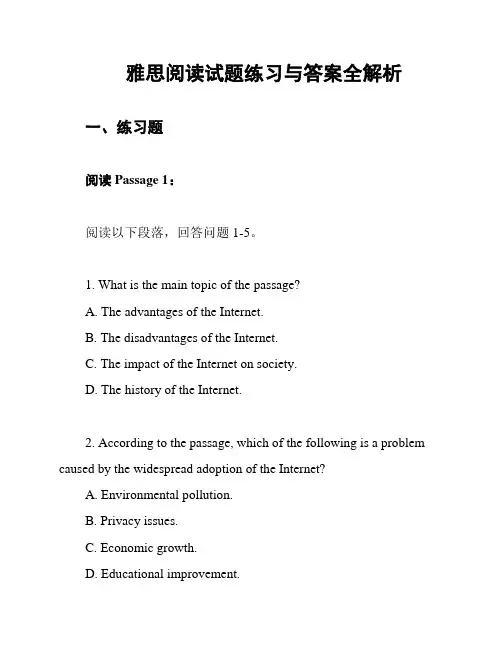
雅思阅读试题练习与答案全解析一、练习题阅读Passage 1:阅读以下段落,回答问题1-5。
1. What is the main topic of the passage?A. The advantages of the Internet.B. The disadvantages of the Internet.C. The impact of the Internet on society.D. The history of the Internet.2. According to the passage, which of the following is a problem caused by the widespread adoption of the Internet?A. Environmental pollution.B. Privacy issues.C. Economic growth.D. Educational improvement.3. Why does the Internet lead to social isolation?A.因为它改变了人们的交流方式B.因为它使人们更容易获取信息C.因为它促进了全球连接D.因为它提供了更多的娱乐方式4. Which of the following is NOT mentioned in the passage?A. Privacy issues.B. The spread of misinformation.C. Social isolation.D. Education inequality.5. In the author's opinion, how should people use the Internet responsibly?A. They should limit their online activities to protect their privacy.B. They should only consume information from trusted sources.C. They should spend more time on social media to stay connected.D. They should use the Internet as an educational tool to enhance their knowledge.阅读Passage 2:阅读以下段落,回答问题6-10。
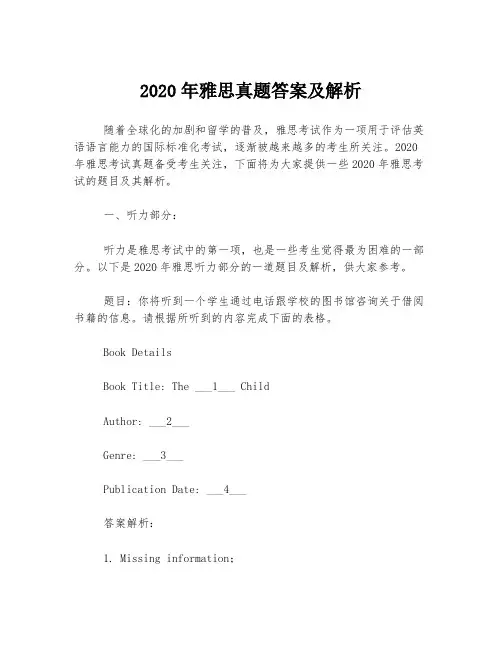
2020年雅思真题答案及解析随着全球化的加剧和留学的普及,雅思考试作为一项用于评估英语语言能力的国际标准化考试,逐渐被越来越多的考生所关注。
2020年雅思考试真题备受考生关注,下面将为大家提供一些2020年雅思考试的题目及其解析。
一、听力部分:听力是雅思考试中的第一项,也是一些考生觉得最为困难的一部分。
以下是2020年雅思听力部分的一道题目及解析,供大家参考。
题目:你将听到一个学生通过电话跟学校的图书馆咨询关于借阅书籍的信息。
请根据所听到的内容完成下面的表格。
Book DetailsBook Title: The ___1___ ChildAuthor: ___2___Genre: ___3___Publication Date: ___4___答案解析:1. Missing information;2. Phillips;3. Romance;4. 2020.二、口语部分:雅思口语部分通常由三个部分组成,其中Part 2是考生最需要准备的一个环节。
以下是2020年雅思口语Part 2的一道题目及解析,供大家参考。
题目:描述一个你希望参加的体育比赛。
答案解析:这个题目要求考生描述一个自己期望参加的体育比赛。
考生可以选择任何一项体育运动,如足球比赛、篮球比赛或者田径比赛等等。
在回答时,考生可以从以下几个方面展开:1. 决定参加这个比赛的原因:比如对这项运动的兴趣、想要挑战自己等等;2. 参加这个比赛的准备工作:比如必要的训练、技巧的磨练等等;3. 比赛过程的描述:比如比赛的规则、自己的表现等等;4. 比赛结束后的感受:自己对比赛结果的评价、对自身表现的评价等等。
通过以上几个方面的描述和分析,考生可以较为全面地回答这个问题,并且展示出自己对体育比赛的理解和思考。
三、阅读部分:阅读部分是雅思考试中的第二项,在时间上也相对较长。
以下是2020年雅思阅读部分的一道题目及解析,供大家参考。
题目:阅读下面的文章,回答问题。
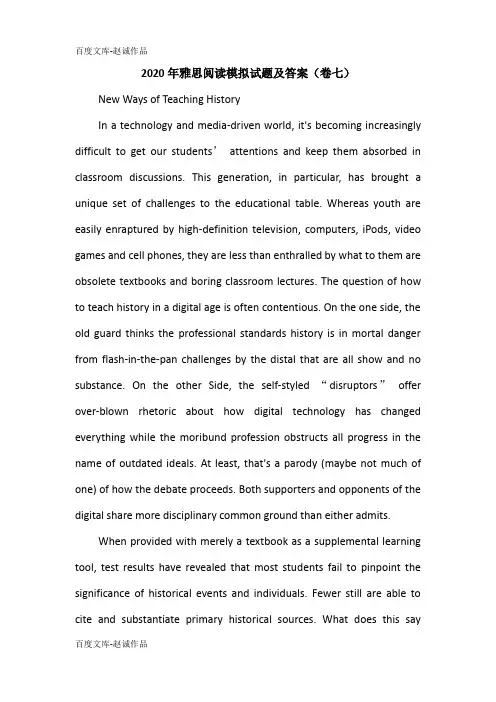
2020年雅思阅读模拟试题及答案(卷七)New Ways of Teaching HistoryIn a technology and media-driven world, it's becoming increasingly difficult to get our students’attentions and keep them absorbed in classroom discussions. This generation, in particular, has brought a unique set of challenges to the educational table. Whereas youth are easily enraptured by high-definition television, computers, iPods, video games and cell phones, they are less than enthralled by what to them are obsolete textbooks and boring classroom lectures. The question of how to teach history in a digital age is often contentious. On the one side, the old guard thinks the professional standards history is in mortal danger from flash-in-the-pan challenges by the distal that are all show and no substance. On the other Side, the self-styled “disruptors”offer over-blown rhetoric about how digital technology has changed everything while the moribund profession obstructs all progress in the name of outdated ideals. At least, that's a parody (maybe not much of one) of how the debate proceeds. Both supporters and opponents of the digital share more disciplinary common ground than either admits.When provided with merely a textbook as a supplemental learning tool, test results have revealed that most students fail to pinpoint the significance of historical events and individuals. Fewer still are able to cite and substantiate primary historical sources. What does this sayabout the way our educators are presenting information? The quotation comes from a report of a 1917 test of 668 Texas students. Less than 10 percent of school-age children attended high school in 1917; today, enrollments are nearly universal. The whole world has turned on its head during the last century but one thing has stayed the same: Young people remain woefully ignorant about history reflected from their history tests. Guess what? Historians are ignorant too, especially when we equate historical knowledge with the "Jeopardy" Daily Double. In a test, those specializing in American history did just fine. But those with specialties in medieval, European and African history failed miserably when confronted by items about Fort Ticonderoga, the Olive Branch Petition, or the Quebec Act —all taken from a typical textbook. According to the testers, the results from the recent National Assessment in History, like scores from earlier tests, show that young people are "abysmally ignorant" of their own history. Invoking the tragedy of last September, historian Diane Ravitch hitched her worries about our future to the idea that our nation's strength is endangered by youth who do poorly on such tests. But if she were correct, we could have gone down the tubes in 1917!There is a huge difference between saying "Kids don’t know the history we want then to know" and saying "Kids don't know history at all." Historical knowledge burrows itself into our cultural pores even ifyoung people can't marshal it when faced by a multiple choice test. If we weren’t such hypocrites (or maybe if we were better historians) we'd have to admit that today's students follow in our own footsteps. For too long we've fantasized that by rewriting textbooks we could change how history is learned. The problem, however, is not the content of textbooks but the very idea of them. No human mind could retain the information crammed into these books in 1917, and it can do no better now. If we have learned anything from history that can be applied to every time period, it is that the only constant is change. The teaching of history, or any subject for that matter, is no exception. The question is no longer whether to bring new technologies into everyday education; now, the question is which There is a huge difference between saying "Kids don’t know the history we want then to know" and saying "Kids don't know history at all." Historical knowledge burrows itself into our cultural pores even if young people can't marshal it when faced by a multiple choice test. If we weren’t such hypocrites (or maybe if we were better historians) we'd have to admit that today's students follow in our own footsteps. For too long we've fantasized that by rewriting textbooks we could change how history is learned. The problem, however, is not the content of textbooks but the very idea of them. No human mind could retain the information crammed into these books in 1917, and it can do no better now. If we have learned anything from history that can beapplied to every time period, it is that the only constant is change. The teaching of history, or any subject for that matter, is no exception. The question is no longer whether to bring new technologies into everyday education; now, the question is which technologies are most suitable for the range of topics covered in junior high and high school history classrooms. Fortunately, technology has provided us with opportunities to present our Civil War lesson plans or our American Revolution lesson plans in a variety of new ways.Teachers can easily target and engage the learners of this generation by effectively combining the study of history with innovative multimedia- PowerPoint and presentations in particular can expand the scope of traditional classroom discussion by helping teachers to explain abstract concepts while accommodating students* unique learning styles. PowerPoint study units that have been pre-made for history classrooms include all manner of photos, prints, maps, audio clips, video clips and primary sources which help to make learning interactive and stimulating. Presenting lessons in these enticing formats helps technology-driven students retain the historical information they'll need to know for standard exams.Whether you are covering Revolutionary War lesson plans or World War II lesson plans, PowerPoint study units are available in formats to suit the needs of your classroom. Multimedia teaching instruments likePowerPoint software are getting positive results the world over, framing conventional lectures with captivating written, auditory and visual content that helps students recall names, dates and causal relationships within a historical context.History continues to show us that new times bring new realities. Education is no exception to the rule. The question is not whether to bring technology into the educational environment. Rather, the question is which technologies are suitable for U.S. and world history subjects, from Civil War lesson plans to World War II lesson plans. Whether you’re covering your American Revolution lesson plans or your Cold War lesson plans, PowerPoint presentations are available in pre-packaged formats to suit your classroom's needs.Meanwhile, some academic historians hold a different view on the use of technology in teaching history. One reason they hold is that not all facts can be recorded by film or videos and literature is relatively feasible in this case .Another challenge they have to be faced with is the painful process to learn new technology like the making of PowerPoint and the editing of audio and video clips which is also reasonable especially to some elderly historians.QuestionsReading this passage has eight paragraphs, A- GChoosing the correct heading for paragraphs A- G from the list ofheading belowWrite the appropriate number, i- x, in boxes 28-34 on your answer sheetList of Headingsi unavoidable changing facts to be considered when picking up technology meansii A debatable place where the new technologies stand in for history teachingiii Hard to attract students in traditional ways of teaching historyiv Display of the use of emerging multimedia as leaching toolsv Both students and professionals as candidates did not produce decent resultsvi A good concrete example illustrated to show how multimedia animates the history classvii The comparisons of the new technologies applied in history class viii Enormous breakthroughs in new technologiesix Resistance of using new technologies from certain historianx Decisions needed on which technique to be used for history teaching instead of improvement in the textbooks28 Paragraph A29 Paragraph B30 Paragraph C31 Paragraph D32 Paragraph E33 Paragraph F34 Paragraph GQuestion 35-37Do the following statements agree with the information given in Reading Passage?In boxes 35-37 on your answer sheet, writeYES if the statement is trueNO if the statement is falseNOT GIVEN if the information is not given in the passage35 Modem people are belter at memorizing historical information compared with their ancestors.36 New technologies applied in history- teaching are more vivid for students to memorize the details of historical events.37 Conventional ways like literature arc gradually out of fashion as time goes by.Question 38-40Complete the following summary of the paragraphs of Reading Passage, using more than three words from the Reading Passage for each answer.Write your answers in boxes 38-40 on your answer sheet.Contemporary students can be aimed at without many difficulties by integrating studying history with novel. ..38.... Conventional classroom discussion is specially extended by two ways to assist the teachers to interpret ...39... and at the same time retain students' distinct learning modes. PowerPoint study units prepared beforehand comprising a wide variety of elements make ...40.... learning feasible. Combined classes like this can also be helpful in taking required tests.文章题目:历史教学的科技篇章结构:体裁:论述文题目:历史教学的科技结构:(一句话概括每段大意)A 关于科技在历史教学中的使用引起争议。
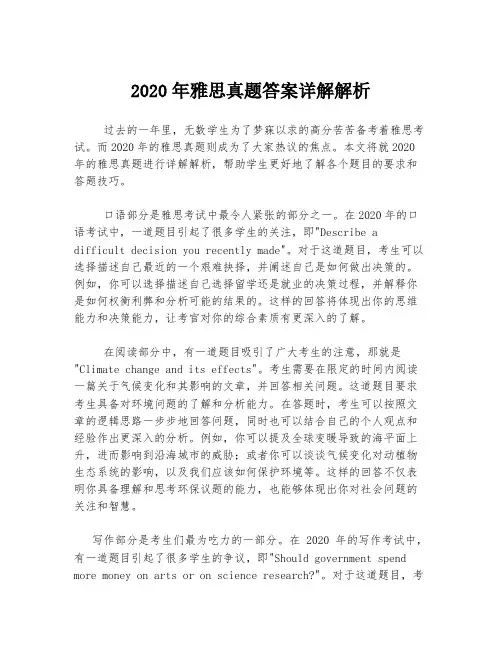
2020年雅思真题答案详解解析过去的一年里,无数学生为了梦寐以求的高分苦苦备考着雅思考试。
而2020年的雅思真题则成为了大家热议的焦点。
本文将就2020年的雅思真题进行详解解析,帮助学生更好地了解各个题目的要求和答题技巧。
口语部分是雅思考试中最令人紧张的部分之一。
在2020年的口语考试中,一道题目引起了很多学生的关注,即"Describe adifficult decision you recently made"。
对于这道题目,考生可以选择描述自己最近的一个艰难抉择,并阐述自己是如何做出决策的。
例如,你可以选择描述自己选择留学还是就业的决策过程,并解释你是如何权衡利弊和分析可能的结果的。
这样的回答将体现出你的思维能力和决策能力,让考官对你的综合素质有更深入的了解。
在阅读部分中,有一道题目吸引了广大考生的注意,那就是"Climate change and its effects"。
考生需要在限定的时间内阅读一篇关于气候变化和其影响的文章,并回答相关问题。
这道题目要求考生具备对环境问题的了解和分析能力。
在答题时,考生可以按照文章的逻辑思路一步步地回答问题,同时也可以结合自己的个人观点和经验作出更深入的分析。
例如,你可以提及全球变暖导致的海平面上升,进而影响到沿海城市的威胁;或者你可以谈谈气候变化对动植物生态系统的影响,以及我们应该如何保护环境等。
这样的回答不仅表明你具备理解和思考环保议题的能力,也能够体现出你对社会问题的关注和智慧。
写作部分是考生们最为吃力的一部分。
在2020年的写作考试中,有一道题目引起了很多学生的争议,即"Should government spend more money on arts or on science research?"。
对于这道题目,考生需要发表自己的观点,并用合理的论证进行支持。
在写作时,你可以先从两种支出的重要性和价值出发,进行分析和比较。
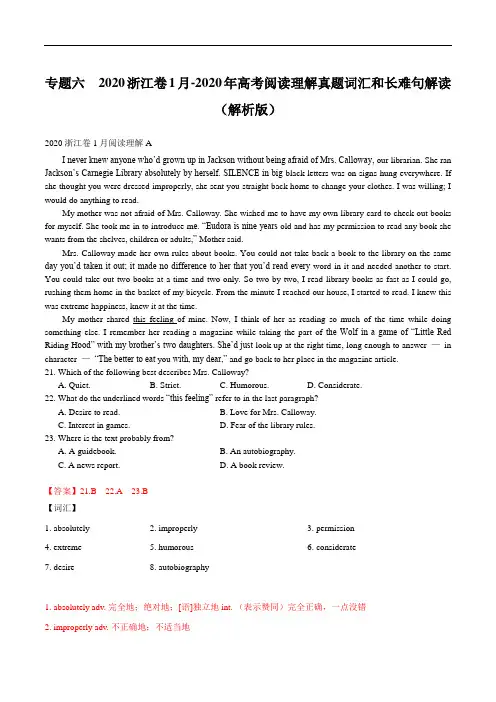
专题六2020浙江卷1月-2020年高考阅读理解真题词汇和长难句解读(解析版)2020浙江卷1月阅读理解AI never knew anyone who’d grown up in Jackson without being afraid of Mrs. Calloway, our librarian. She ran Jackson’s Carnegie Library absolutely by herself. SILENCE in big black letters was on signs hung everywhere. If she thought you were dressed improperly, she sent you straight back home to change your clothes. I was willing; I would do anything to read.My mother was not afraid of Mrs. Calloway. She wished me to have my own library card to check out books for myself. She took me in to introduce m e. “Eudora is nine years old and has my permission to read any book she wants from the shelves, children or adults,” Mother said.Mrs. Calloway made her own rules about books. You could not take back a book to the library on the same day you’d taken it out; it made no difference to her that you’d read every word in it and needed another to start. You could take out two books at a time and two only. So two by two, I read library books as fast as I could go, rushing them home in the basket of my bicycle. From the minute I reached our house, I started to read. I knew this was extreme happiness, knew it at the time.My mother shared this feeling of mine. Now, I think of her as reading so much of the time while doing something else. I remember her reading a magazine while taking the part of the Wolf in a game of “Little Red Riding H ood” with my brother’s two daughters. She’d just look up at the right time, long enough to answer —in character —“The better to eat you with, my dear,” and go back to her place in the magazine article.21. Which of the following best describes Mrs. Calloway?A. Quiet.B. Strict.C. Humorous.D. Considerate.22. What do the underlined words “this feeling” refer to in the last paragraph?A. Desire to read.B. Love for Mrs. Calloway.C. Interest in games.D. Fear of the library rules.23. Where is the text probably from?A. A guidebook.B. An autobiography.C. A news report.D. A book review.【答案】21.B 22.A 23.B【词汇】1. absolutely2. improperly3. permission4. extreme5. humorous6. considerate7. desire 8. autobiography1. absolutely adv. 完全地;绝对地;[语]独立地int. (表示赞同)完全正确,一点没错2. improperly adv. 不正确地;不适当地3. permission n. 许可;允许;同意4. extreme adj. 极度的;极端的n. 极端;极限5. humorous adj. 幽默的;诙谐的6. considerate adj. 考虑周到的;体谅的;体贴的7. desire n. 渴望;愿望;欲望v. 渴望;向往;要求8. autobiography n. 自传【长难句】1. Eudora is nine years old and has my permission to read any book she wants from the shelves, children or adults. 【句子分析】主干部分:Eudora is nine years old and has my permission to read any book定语从句:she wants from the shelves,省略that 修饰book【翻译】尤多拉九岁了,我允许她从书架上读任何一本书,无论是儿童还是成人。
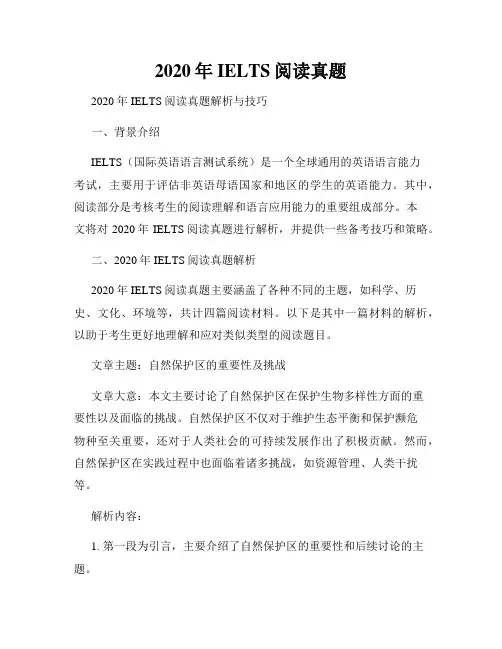
2020年IELTS阅读真题2020年IELTS阅读真题解析与技巧一、背景介绍IELTS(国际英语语言测试系统)是一个全球通用的英语语言能力考试,主要用于评估非英语母语国家和地区的学生的英语能力。
其中,阅读部分是考核考生的阅读理解和语言应用能力的重要组成部分。
本文将对2020年IELTS阅读真题进行解析,并提供一些备考技巧和策略。
二、2020年IELTS阅读真题解析2020年IELTS阅读真题主要涵盖了各种不同的主题,如科学、历史、文化、环境等,共计四篇阅读材料。
以下是其中一篇材料的解析,以助于考生更好地理解和应对类似类型的阅读题目。
文章主题:自然保护区的重要性及挑战文章大意:本文主要讨论了自然保护区在保护生物多样性方面的重要性以及面临的挑战。
自然保护区不仅对于维护生态平衡和保护濒危物种至关重要,还对于人类社会的可持续发展作出了积极贡献。
然而,自然保护区在实践过程中也面临着诸多挑战,如资源管理、人类干扰等。
解析内容:1. 第一段为引言,主要介绍了自然保护区的重要性和后续讨论的主题。
2. 第二段从生物多样性的角度论述了自然保护区的重要作用。
可以提取关键词进行答题。
3. 第三段提到了自然保护区对人类社会的积极影响,如吸引旅游业、改善当地居民的生活等。
4. 第四段开始介绍自然保护区面临的挑战,如资源管理问题、人类活动的干扰等。
5. 最后一段对全文进行总结,并强调了在未来的发展中需要采取措施来解决自然保护区面临的挑战。
通过以上解析,考生可以从整体上把握文章主旨和各个段落的主要内容,为后续的题目解答做好准备。
三、2020年IELTS阅读备考技巧和策略1. 预览题目:在阅读文章之前,先快速浏览一遍题目,了解题目难易程度和需要注意的关键词。
这有助于在阅读过程中更加有针对性地寻找答案。
2. 提取关键信息:在阅读过程中,注意提取文章中的关键信息,包括关键词、数字数据和具体案例。
这有助于加深对文章内容的理解和记忆。
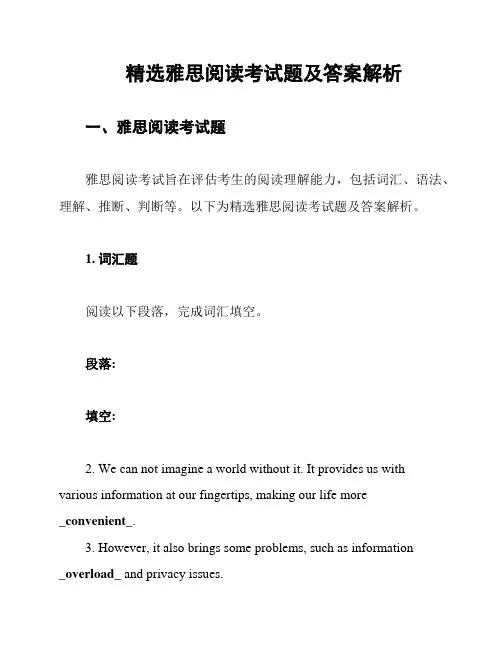
精选雅思阅读考试题及答案解析一、雅思阅读考试题雅思阅读考试旨在评估考生的阅读理解能力,包括词汇、语法、理解、推断、判断等。
以下为精选雅思阅读考试题及答案解析。
1. 词汇题阅读以下段落,完成词汇填空。
段落:填空:2. We can not imagine a world without it. It provides us with various information at our fingertips, making our life more_convenient_.3. However, it also brings some problems, such as information_overload_ and privacy issues.2. 判断题根据以下段落,判断陈述的真假。
段落:判断题:2. We can not imagine a world without it. (False)3. 细节题阅读以下段落,回答问题。
段落:问题:What is the reason for the popularity of online shopping?答案:二、答案解析以下是题目答案及解析。
1. 词汇题答案解析- _essential_: 表示"必要的,基本的"- _convenient_: 表示"方便的"- _overload_: 表示"过载,超负荷"这些词汇都是根据段落内容选取的,能够准确地表达段落中的意思。
2. 判断题答案解析- True: 表示陈述为真,与段落内容相符。
- False: 表示陈述为假,与段落内容不符。
在判断题中,需要根据段落内容判断陈述的真假,需要考生对段落内容有准确的理解。
3. 细节题答案解析- 答案解析: 根据段落内容,可以得知在线购物之所以受欢迎,是因为人们可以在家中舒适地购买产品,并让它们送到门口。
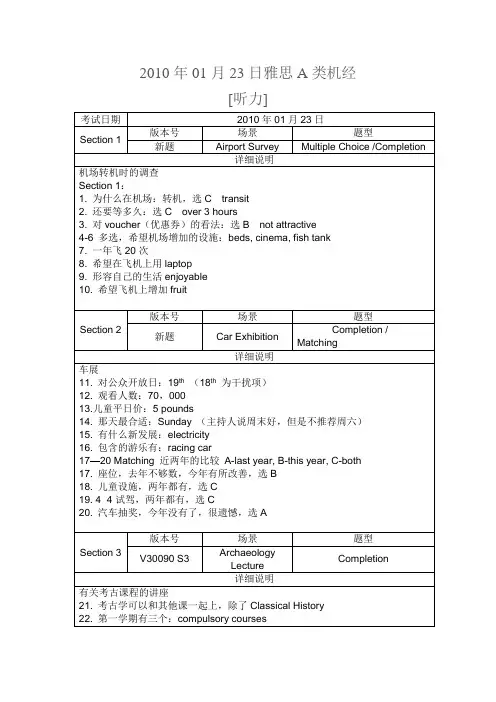
2010年01月23日雅思A类机经[听力][口语] Part 1Introduction:1. What is your name?2. What is the meaning of your name?3. Are your working or studying?4. Who gave you your name?Reading5. Do children read more now than before?6. Do you like to read newspaper?7. How much time do you spend in reading newspaper?8. When you were young, what kind of book did you like to read?9. What kind of book do young people like to read?10. When did you begin to read newspapers?11. How many kinds of newspapers are there in China?12. Do you prefer to read local news or international news?13. Do you think news is important in people’s life?*Art14. Tell me something about your favorite art.15. Tell me something about your favorite music.16. What kind of art did you do when you were a child?17. What kind of art did you do when you were a child?*House18. Do you live in a flat or in a house?19. Do you have garden in your house?20. What do you have in your house?21. Do you have decorations in your house? ( Ex. Decorations in the walls )22. What can you see outside your window?*Weather23. What is your favorite weather?*School24. Tell me something about your school.25. What is your impression of your school?26. Do you like the teachers in your school?27. Do you want to be a teacher?*Job28. What is the hardest part of your job?29. What is good about being a student?*TV program30. What kind of TV program do you like?31. How can you get an access to English TV programs?32. Do you think English programs are helpful?*Holidays33. How do people spend their holidays?34. Do you think it’s important to have a vacation? Why? *Hometown35. Where is your hometown?36. Are there any changes in your hometown now?37. What is the best thing you have in your hometown?38. What is the biggest problem in your hometown?*School39. Do you like your school?40. Why did you choose this school?41. Where do you study?42. Do you prefer to study or work?43. Do you like your course?*Event44. Tell me something about a happy event.45. Tell me something about a happy event in your family.46. Do you like your course?*Internet47. What do you think about the internet?48. What are the advantages of internet?*Birthday49. How do Chinese people celebrate their birthdays?50. How did you celebrate your last birthday?*Gift51. What kind of gift do you want to give your friend?*Music52. What kind of music do you like?*Sports53. Do you have sports?54. What is the importance of having a sport?55. What kind of physical exercise do you like?*Evening56. What do you usually do in the evening?57. Do you like to go out in the evening? What do you usually do?58. Do you think weekends are important?*Planting59. Do Chinese people plant in their garden?60. What kind of plants do you want to have in your garden?*Transportation61. What kind of transportation do you usually take?*Communicating62. Would you talk to people whom you met for the first time?63. Why do you want to chat with other people?*Clothes64. What kind of clothes do you like to wear?65. Do you like to wear formal clothes?66. What is your opinion about wearing uniforms?67. Can you judge a person by their clothes their wearing?*Household Chores68. What do you dislike about household chores?69. Do you think it is necessary for a child to help in household chores?70. Do you like to do housework?71. What kind of housework do you usually do?Part 2&3PersonDescribe a teenagerWhat are the differences between teenagers and children?How have their lives changed in the last decade?Until what age do you think they can qualify for being adults?Until what age should they get married?What role does the school play in the process of students turning from teenagers to adults?What kind of attitude is generally shared by teenagers towards adults?Describe a person you admireDescribe a successful personWhy do you think he/she is successful?How to succeed in your life? Please draw on your personal experienceDo you send books to others as gifts?What kind did you read when you were a child?Is it possible to continue part-time study while working?Describe a visitor to your familyDo Chinese people have the tradition of paying a visit to your relatives or friends on a regular basis?What gifts do people send when visiting your friends?Do visitors stay in the hotel or at home?How to improve hotel service in general?Describe a friend you meet at schoolShould government provide financial assistance to the elderly people?Describe a person who is good at his or her jobIs it the responsibility of universities to help students to find their ideal jobs?What sort of jobs suit young adults and what sort of jobs suit elderly people?Should an age limit be imposed on certain jobs?Should companies have the responsibility of providing training to young people?How is company training carried out?*EventDescribe a family eventHow do you define happiness?Describe a recent event that has made you happyDo you think money is important?Do you think money can give you happiness?Can old people get happiness?Describe a physical activityWhat are your favorite physical activities?Why do you like them?What kind of sports do you usually engage yourself in?Why do you prefer to go to the gym?Describe a recent change in your lifeDo old people like to change their lives?Do young people like changes?What’s your opini on towards switching jobs on a regular basis?*ObjectDescribe a magazineWhat are the differences between magazine and newspaper and other forms of mass media such as the Internet?Describe an interesting news you read on newspaper or TVHow often do people in your country read newspaper?Which one is a popular medium for obtaining information, radio or TV?Do you think we should have more entertainment news in the future?Which one is more important, local news or international news?Describe a photographDo you like painting or taking photographs?Why do some people not like taking photographs?What sort of pictures are considered most appealing to people?Describe a filmDescribe a good lawDo you think the “one-child” polic y in China is considered a good law?Should we tell our children stories concerning robbing the rich so as to help the poor people?Should we comply with laws?Describe a website you have visited that is useful to youHow did you manage to find this website?Why do you choose to talk about this website?What’s the range of people using Internet in your country?What do you think about online shopping?How would you convince an elderly person to learn to use the Internet if he had never used it before and was resistant to modern technology?Describe a pictureDescribe a skill you want to learnDescribe a letter you have receivedDescribe a book you have recently readDescribe one particular regulation employed during Olympic GamesWhat performances have you watched and with whom?What game have you played in your childhood?Describe a programDescribe a useful toolDescribe the help you have received beforeWhy do modern people not like to help others?How should help others?How to cultivate our children to develop the habit of helping others?*PlaceDescribe a place you have studied or workedWhen and where did you work?How do you think about the workplace?How do you plan your work?What do you want to do in the future?Do you think women should stay at home as a full-time housewife or go out to look for jobs?Why do you like the university you have studied in?What’s your plan after graduation?Are there any beautiful views in your university?Is it necessary for university to purchase teaching equipment?Describe a place you can listen to musicDescribe a shop that you like to visitWhy do some people not like to go shopping?What are the differences between big shops and small shops?Apart from shops, is there any other ways that people can buy things?What are some of the problems in cities?What are some of the environmental problems caused in cities?Describe a place you would like to introduce to your friendsDescribe a city you likeDescribe a polluted cityDescribe a garden you likeDo you think garden is important?Should people in the city know much about the country life? *AnimalDescribe an interesting animalAre you a vegetarian?Should animals be kept in cities or countryside?What are some of the problems related to raising pets?[阅读][作文]。
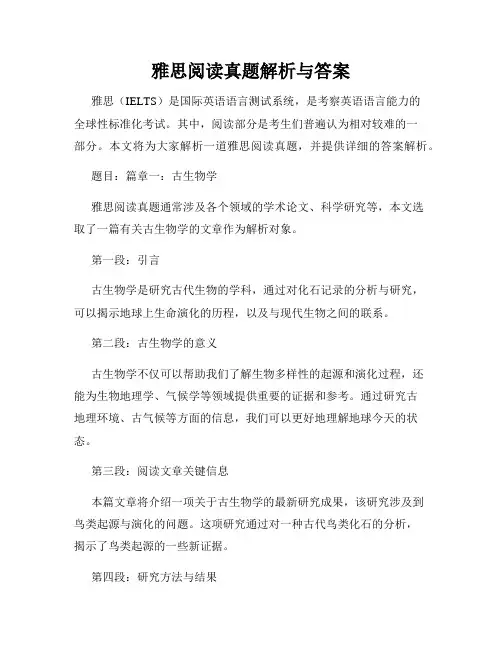
雅思阅读真题解析与答案雅思(IELTS)是国际英语语言测试系统,是考察英语语言能力的全球性标准化考试。
其中,阅读部分是考生们普遍认为相对较难的一部分。
本文将为大家解析一道雅思阅读真题,并提供详细的答案解析。
题目:篇章一:古生物学雅思阅读真题通常涉及各个领域的学术论文、科学研究等,本文选取了一篇有关古生物学的文章作为解析对象。
第一段:引言古生物学是研究古代生物的学科,通过对化石记录的分析与研究,可以揭示地球上生命演化的历程,以及与现代生物之间的联系。
第二段:古生物学的意义古生物学不仅可以帮助我们了解生物多样性的起源和演化过程,还能为生物地理学、气候学等领域提供重要的证据和参考。
通过研究古地理环境、古气候等方面的信息,我们可以更好地理解地球今天的状态。
第三段:阅读文章关键信息本篇文章将介绍一项关于古生物学的最新研究成果,该研究涉及到鸟类起源与演化的问题。
这项研究通过对一种古代鸟类化石的分析,揭示了鸟类起源的一些新证据。
第四段:研究方法与结果研究团队采用了先进的扫描电镜技术对化石进行了高分辨率的成像。
通过观察化石的细节结构,研究人员发现了一些与现代鸟类非常相似的特征,这表明这种古代鸟类与现代鸟类之间存在着密切的亲缘关系。
第五段:研究成果的意义与启示这项研究的成果为鸟类起源与演化提供了新的证据,有助于我们更加全面地认识鸟类的起源和演化过程。
另外,这项研究结果还与古气候学、古地理学等相关领域的研究相互印证,提供了进一步探索生命起源与地球演化过程的线索。
答案解析:1. 古生物学的研究对象是什么?答案:古生物学的研究对象是古代生物,通过对化石记录的分析与研究来揭示地球上生命演化的历程。
2. 古生物学在哪些领域有应用?答案:古生物学在生物地理学、气候学等领域有应用,可以提供重要的证据和参考,帮助我们理解地球今天的状态。
3. 本篇文章的主要内容是什么?答案:本篇文章介绍了一项关于鸟类起源与演化的最新研究成果,通过对一种古代鸟类化石的分析,揭示了鸟类起源的新证据。
1月23日雅思阅读答案解析or high-voltage power grids; no pasteurisation,pesticides or biotechnology; no quantum mechanics; no wheel; no “discovery” of America. In short,their message was: no risk,no gain.C Theyhave absolutely missed the point. The precautionary principle is a subtle idea.It has various forms, but all of them generally include some notion ofcost-effectiveness. Thus the point is not simply to ban things that are notknown to be absolutely safe. Rather, it says: ’’Of course you can make noprogress without risk. But if there is no obvious gain from taking the risk,then don’t take it.”D Clearly, all the technologies listed by the 40well-chosen savants were innately risky at their inception, as all technologiesarc. But all of them would have received the green light under theprecautionary principle because they all had the potential to offer tremendousbenefits-- the solutions to very big problems-- if only the snags could beovercome.E If theprecautionary principle had been in place,the scientists tell us, we would not haveantibiotics. But of course we would - if the version of the principle thatsensible people now understand had been applied. When penicillin was discoveredin the 1920s, infective bacteria were laying waste to the world. Children diedfrom diphtheria and whooping cough,every open drain brought the threat of typhoid,and any wound could lead to septicaemia and even gangrene.F Penicillin was turned into a practical drugduring the Second World War, when the many pestilences that result from warthreatened to kill more people than the bombs. Of course antibiotics were apriority. Of course the risks, such as they could be perceived, were worthtaking.G And so with the other items on the scientists’list: electric light bulbs, blood transfusions, CAT scans, knives, the measlesvaccine —the precautionary principle would have prevented all of them, theytell us. But this is just plain wrong. If the precautionary principle had beenapplied properly, all these creations would have passed muster, because alloffered incomparable advantages compared to the risks perceived at the time.H Another issue is at stake here. Statistics arenot the only concept people use when weighing up risk. Human beings, subtle andevolved creatures that we are, do not survive to three-score years and tensimply by thinking like pocket calculators. A crucial issue is consumer’schoice. In deciding whether to pursue the development of a new technology, theconsumer’s right to choose should be considered alongside considerations ofrisk and benefit. Clearly, skiing is more dangerous than genetically modifiedtomatoes. But people who ski choose to do so; they do not have skiing thrustupon them by portentous experts of the kind who now feel they have the right toreconstruct our crops. Even with skiing there is the matter of costeffectiveness to consider: skiing, I am told, is exhilarating. Where is theexhilaration in GM soya?I Indeed, incontrast to all the other items on Spiked’s list, GM crops stand out as anexample of。
2020年1月23日雅思阅读真题or high-voltage power grids; no pasteurisation,pesticides or biotechnology; no quantum mechanics; no wheel; no "discovery” of America. In short,their message was: no risk,no gain.C Theyhave absolutely missed the point. The precautionary principle is a subtle idea.It has various forms, but all of them generally include some notion ofcost-effectiveness. Thus the point is not simply to ban things that are notknown to be absolutely safe. Rather, it says:’’Of course you can make noprogress without risk. But if there is no obvious gain from taking the risk,then don’t take it.”D Clearly, all the technologies listed by the 40well-chosen savants were innately risky at their inception, as all technologiesarc. But all of them would have received thegreen light under theprecautionary principle because they all had the potential to offer tremendousbenefits-- the solutions to very big problems-- if only the snags could beovercome.E If theprecautionary principle had been in place,the scientists tell us, we would not haveantibiotics. But of course we would - if the version of the principlethatsensible people now understand had been applied. When penicillin was discoveredin the 1920s, infective bacteriawere laying waste to the world. Children diedfrom diphtheria and whooping cough,every open drain brought the threat of typhoid,and any wound could lead to septicaemia and even gangrene.F Penicillin was turned into a practical drugduring the Second World War, when the many pestilences that result from warthreatened to kill more people than the bombs. Of course antibiotics were apriority. Of course the risks, such as they could be perceived, were worthtaking.G And so with the other items on the scientists'list:electric light bulbs, blood transfusions, CAT scans, knives, the measlesvaccine —the precautionary principle would have prevented all of them, theytell us. But this is just plain wrong. If the precautionary principle had beenapplied properly, all these creations would have passed muster, because alloffered incomparable advantages compared to the risks perceived at the time.H Another issue is at stake here. Statistics arenot the only concept people use when weighing up risk. Human beings, subtle andevolved creatures that we are, do not survive to three-score years and tensimply by thinking like pocket calculators. A crucial issue is consumer’schoice. Indeciding whether to pursue the development of a new technology, theconsumer's right to choose should beconsidered alongside considerations ofrisk and benefit. Clearly, skiing is more dangerous than genetically modifiedtomatoes. But people who ski choose to do so; they do not have skiing thrustupon them by portentous experts of the kind who now feel they have the right toreconstruct our crops. Even with skiing there is the matter of costeffectiveness to consider: skiing, I am told, is exhilarating. Where is theexhilaration in GM soya?I Indeed, incontrast to all the other items on Spiked's list, GM crops stand out as anexample of。
1月23日雅思阅读真题or high-voltage power grids; no pasteurisation,pesticides or biotechnology; no quantum mechanics; no wheel; no “discovery” of America. In short,their message was: no risk,no gain.C Theyhave absolutely missed the point. The precautionary principle is a subtle idea.It has various forms, but all of them generally include some notion ofcost-effectiveness. Thus the point is not simply to ban things that are notknown to be absolutely safe. Rather, it says: ’’Of course you can make noprogress without risk. But if there is no obvious gain from taking the risk,then don’t take it.”D Clearly, all the technologies listed by the 40well-chosen savants were innately risky at their inception, as all technologiesarc. But all of them would have received the green light under theprecautionary principle because they all had the potential to offer tremendousbenefits-- the solutions to very big problems-- if only the snags could beovercome.E If theprecautionary principle had been in place,the scientists tell us, we would not haveantibiotics. But of course we would - if the version of the principle thatsensible people now understand had been applied. When penicillin was discoveredin the 1920s, infective bacteria were laying waste to the world. Children diedfrom diphtheria and whooping cough,every open drain brought the threat of typhoid,and any wound could lead to septicaemia and even gangrene.F Penicillin was turned into a practical drugduring the Second World War, when the many pestilences that result from warthreatened to kill more people than the bombs. Of course antibiotics were apriority. Of course the risks, such as they could be perceived, were worthtaking.G And so with the other items on the scientists’list: electric light bulbs, blood transfusions, CAT scans, knives, the measlesvaccine —the precautionary principle would have prevented all of them, theytell us. But this is just plain wrong. If the precautionary principle had beenapplied properly, all these creations would have passed muster, because alloffered incomparable advantages compared to the risks perceived at the time.H Another issue is at stake here. Statistics arenot the only concept people use when weighing up risk. Human beings, subtle andevolved creatures that we are, do not survive to three-score years and tensimply by thinking like pocket calculators. A crucial issue is consumer’schoice. In deciding whether to pursue the development of a new technology, theconsumer’s right to choose should be considered alongside considerations ofrisk and benefit. Clearly, skiing is more dangerous than genetically modifiedtomatoes. But people who ski choose to do so; they do not have skiing thrustupon them by portentous experts of the kind who now feel they have the right toreconstruct our crops. Even with skiing there is the matter of costeffectiveness to consider: skiing, I am told, is exhilarating. Where is theexhilaration in GM soya?I Indeed, incontrast to all the other items on Spiked’s list, GM crops stand out as anexample of。
2020年雅思阅读模拟试题及答案(卷二)2020年雅思阅读模拟试题及答案(卷二)ABondi Beach, Australia's most famous beach is located in the suburb of Bondi, in the Local Government Area of Waverley, seven kilometers from the centre of Sydney. "Bondi" or "Boondi" is an Aboriginal word meaning water breaking over rocks or the sound of breaking waves. The Australian Museum records that Bondi means place where a flight of nullas took place.BThe indigenous people of the area boost a wealth of unique cultures and traditions. The aboriginal rock art is believed to be most typical art form, consisting of rock paintings and rock engravings. There are still Aboriginal rock carvings left on the northern end of the beach at Ben Buckler and south of Bondi Beach near McKenzies Beach on the coastal walk. Later, the British arrived in Australia and constructed the first settlement in Sydney Cove on 26 January, l788.The category "Aboriginal Australians" was coined by the British after they began colonising Australia, to refer collectively to all people they found already inhabiting the continent, and later to the descendants of any of those people.CFrom the mid-1800s, Bondi Beach was a favourite location for family outings and picnics. The beginnings of the suburb go back to 1809,when the early road builder. William Roberts received from Governor Bligh a grant of 81 hectares of what is now most of the business and residential area of Bondi Beach. In 1851. EdwardSmith Hall and Francis O'Brien purchased 200 acres of the Bondi area that embraced almost the whole frontage of Bondi Beach, and it was named the "The Bondi Estate". Between 1855 and 1877 O'Brien purchased Hall's share of the land, renamed the land the "O'Brien Estate", and made the beach and the surrounding land available to the public as a picnic ground and amusement resort. As the beach became increasingly popular. O'Brien threatened to stop public beach access. However, the Municipal Council believed that the Government needed to intervene to make the beach a public reserve.DDuring the 1900s, beach became associated with health, leisure and democracy —a playground everyone could enjoy equally Bondi Beach was a working class suburb throughout most of the twentieth century with migrant people from New Zealand comprising the majority of the local population. The first tramway reached the beach in 1884. Following this, tram became the first public transportation in Bondi. As an alternative, this action changed the rule that only rich people can enjoy the beach. By the 1930s Bondi was drawing not only local visitors but also people from elsewhere in Australia and overseas. Advertising at thetime referred to Bondi Beach as the "Playground of the Pacific".EThere is a growing trend that people prefer relaxing near seaside instead of living unhealthily in cities. Related research shows that spending time by the ocean has many positive effects on health and well-being. When you put a person in a beach environment." It’s not going to be any great surprise to you thatpeople relax" said study researcher Mathew White, an environmental psychologist at Sydney. According to his experiment, ocean exposure could be a useful form of therapy. Therefore more people move to Bondi in order to experience a healthy and pure life. The beautiful and magnificent scenery of Bondi Beach —sapphire-like sky and transparent sea, along with people wandering on the sand, all contribute to an incredible picture. Besides, swimming and surfing are also popular and it would be too stupid to waste the gifted resources.FBondi Beach is the end point of the City to Surf Fun Run which is held each year in August. Australian surf carnivals further instilled this image. A Royal Surf Carnival was held at Bondi Beach for the Queen Elizabeth II during her first visit to Australia in 1954. Since 1867, there have been over fifty visits by a member of the British Royal Family to Australia. In addition, the Bondi Beach Market is open every Sunday.。
一月份雅思阅读原题英文文档:The January IELTS Reading Original QuestionsThe January IELTS reading test includes various topics such as science, history, culture, and lifestyle.In this article, we will provide you with some original reading questions from the January IELTS test.By practicing these questions, you can better prepare for the IELTS reading section.1.Passage: The History of ComputersQuestion 1: Which of the following statements is NOT true according to the passage?a) The first computer was invented by Charles Babbage in the 19th century.b) Alan Turing played a significant role in the development of computer science.c) The Internet was invented in the 1960s.Question 2: What is the main idea of the passage?a) The history of computers dates back to the 19th century.b) Computers have become an essential part of our daily lives.c) The Internet has greatly influenced the development of computers.2.Passage: The Importance of ExerciseQuestion 1: According to the passage, which of the following benefitsof exercise is NOT mentioned?a) Exercise helps improve mental health.b) Exercise can prevent chronic diseases such as diabetes and heart disease.c) Exercise is necessary for weight loss.Question 2: What is the author"s attitude towards regular exercise?a) They think it is unnecessary for overall health.b) They believe it is essential for maintaining good health.c) They think exercise is only important for athletes.中文文档:一月份雅思阅读原题一月份的雅思阅读测试包括科学、历史、文化和生活方式等各种主题。
2020年1月23日雅思阅读答案解析
or high-voltage power grids; no pasteurisation,pesticides or biotechnology; no quantum mechanics; no wheel; no "discovery” of America. In short,their message was: no risk,no gain.
C Theyhave absolutely missed the point. The precautionary principle is a subtle idea.It has various forms, but all of them generally include some notion ofcost-effectiveness. Thus the point is not simply to ban things that are notknown to be absolutely safe. Rather, it says:’’Of course you can make noprogress without risk. But if there is no obvious gain from taking the risk,then don’t take it.”
D Clearly, all the technologies listed by the 40well-chosen savants were innately risky at their inception, as all technologiesarc. But all of them would have received the
green light under theprecautionary principle because they all had the potential to offer tremendousbenefits-- the solutions to very big problems-- if only the snags could beovercome.
E If theprecautionary principle had been in place,the scientists tell us, we would not haveantibiotics. But of course we would - if the version of the principle
thatsensible people now understand had been applied. When penicillin was discoveredin the 1920s, infective bacteria
were laying waste to the world. Children diedfrom diphtheria and whooping cough,every open drain brought the threat of typhoid,and any wound could lead to septicaemia and even gangrene.
F Penicillin was turned into a practical drugduring the Second World War, when the many pestilences that result from warthreatened to kill more people than the bombs. Of course antibiotics were apriority. Of course the risks, such as they could be perceived, were worthtaking.
G And so with the other items on the scientists'list:electric light bulbs, blood transfusions, CAT scans, knives, the measlesvaccine —the precautionary principle would have prevented all of them, theytell us. But this is just plain wrong. If the precautionary principle had beenapplied properly, all these creations would have passed muster, because alloffered incomparable advantages compared to the risks perceived at the time.
H Another issue is at stake here. Statistics arenot the only concept people use when weighing up risk. Human beings, subtle andevolved creatures that we are, do not survive to three-score years and tensimply by thinking like pocket calculators. A crucial issue is consumer’schoice. In
deciding whether to pursue the development of a new technology, theconsumer's right to choose should be
considered alongside considerations ofrisk and benefit. Clearly, skiing is more dangerous than genetically modifiedtomatoes. But people who ski choose to do so; they do not have skiing thrustupon them by portentous experts of the kind who now feel they have the right toreconstruct our crops. Even with skiing there is the matter of costeffectiveness to consider: skiing, I am told, is exhilarating. Where is theexhilaration in GM soya?
I Indeed, incontrast to all the other items on Spiked's list, GM crops stand out as anexample of。